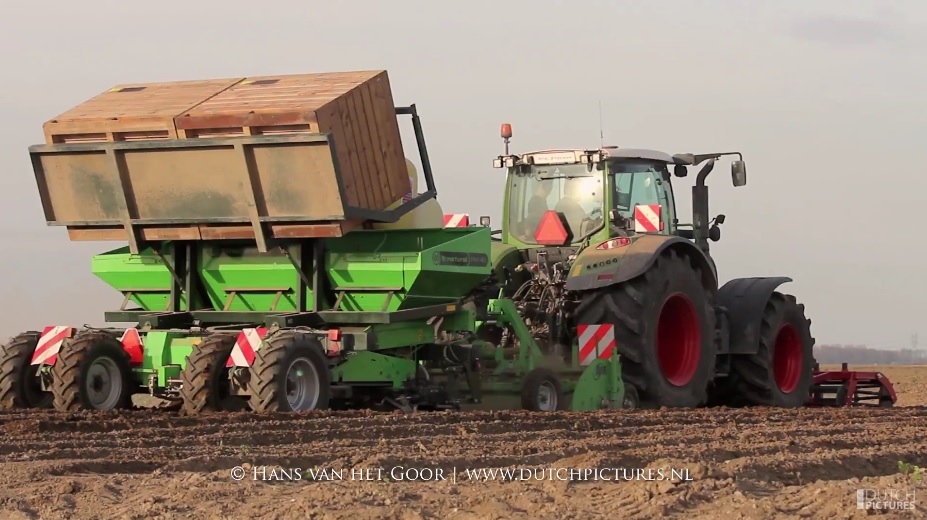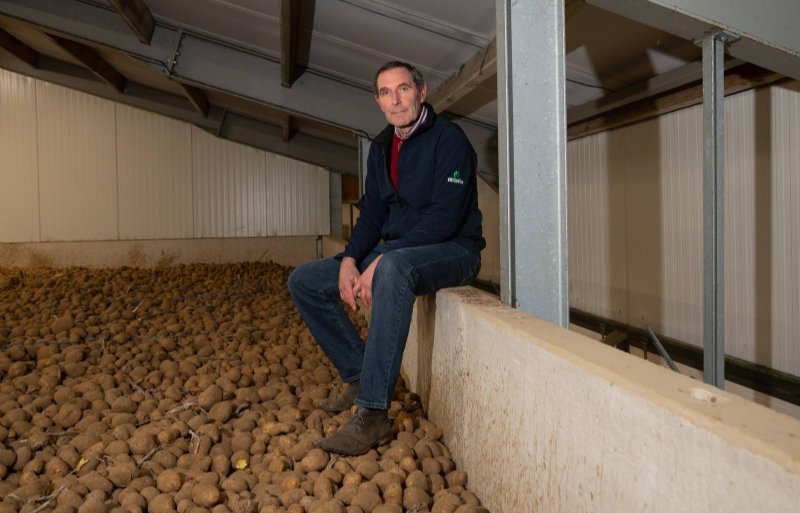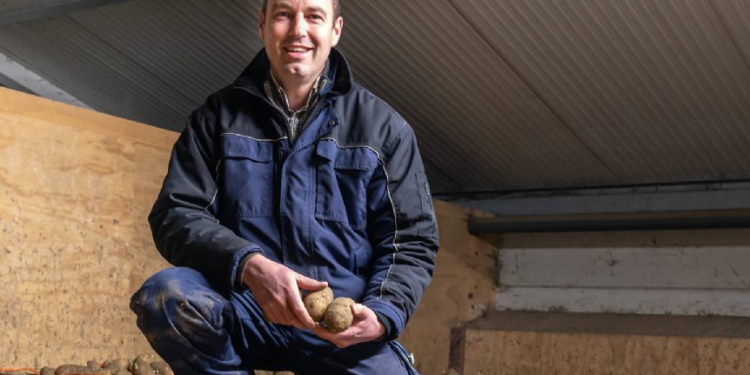A correct balance between yield and cost is important for the perspective of potato cultivation. This is the conclusion of arable farm managers Mathieu Vrancken of the Boerenbond in Belgium and Hendrik Jan ten Cate on behalf of LTO Nederland. Both argue for a fair distribution of the risks in the potato chain. ‘We have to come to an agreement with our customers’, Vrancken assumes. “We’re in the same boat, after all.”
The trees grew to the sky and everyone seemed to be looking for the limit, Mathieu Vrancken describes the situation in the potato sector until the spring of 2020. ‘But corona put us back on the ground quite cruelly. We didn’t see that blow coming. ‘
In a joint interview with Nieuwe Oogst and the Belgian trade magazine Boer & Tuinder, Vrancken and his Dutch fellow director Hendrik Jan ten Cate of LTO Akkerbouw discuss the impact of corona on the future of the potato sector. Both directors agree that the aftermath of this crisis will continue for a while. ‘Only when all major events can be organized again will there be some air in the potato market,’ says Ten Cate.
How can the situation in the potato sector in the Netherlands and Belgium be described at the moment?
Vrancken: ‘It is difficult. As long as corona plays tricks on us, we notice that in sales. In October I was still optimistic due to the moderate harvest and the improving processing figures for chips. But the new lockdown from a few weeks ago again throws a spanner in the works.
‘My fear now is that this sales season for free potatoes has been lost. The recent upturn in the futures market seems mostly a dead sparrow. In any case, it is to be hoped that the contract potatoes will find their way to the processors this year. ‘
Ten Cate: ‘The Dutch situation is not much different, unfortunately. In the short term, there is little hope of improvement due to the limitation of movement caused by corona. There may be opportunities later in the season for potatoes that can be stored for a long time. For example when it will be a late spring. ‘
What do you think should be done with the potato area for the next growing season?
Vrancken: ‘It’s a matter of’ less is more ‘. We will have to adjust our acreage to get the market back into balance. In the positive scenario, we assume that the demand for processed potatoes will fully recover in 2021. Then we have to deal with the enormous stocks that processors have built up.

‘At our own company, we decided in the spring of 2020 to plant more than 10 percent fewer potatoes than originally planned. Our consideration at the time was that it would be better to set our earnings to zero than to make a loss with our potatoes on the open market.
Ten Cate: ‘Giving advice about the acreage to individual growers is difficult. In any case, it is important not to plant indiscriminately if there is no good sales in return. Then it is better to look at alternative crops with a better market perspective, in order to spread the risks more. ‘
Are there indications of lower contract prices?
Vrancken: ‘We have noticed that the industry is slower in announcing contract prices. Normally there is more clarity about this at this point in the season. The first reports point to lower contracts for deliveries to the country and there are also indications that the higher storage costs will not be paid for later deliveries. ‘

© Photography Twan Wiermans
Ten Cate: ‘Based on contacts with processors, I have no confirmation about lower contract prices. I do hear that more fixed price contracts are being offered for lower volumes. In recent years, 45 or 50 tons per hectare have often been laid down. But that now seems to be being adjusted downwards. ‘
What does this mean for potato growers?
Ten Cate: ‘It may be clear that a reduction in contract prices is really disastrous at the moment. There is no room to produce potatoes for even less. If we look at the cost price, the contracts should actually go up.
‘We call on growers to calculate properly before agreeing to a contract. We also appeal to our customers to pass on rising production costs in the chain. Otherwise we will lose perspective in potato cultivation. ‘
What are the higher cost prices based on?
Ten Cate: ‘The disappearance of Chlorine IPC is particularly important for long-term storage. At my own company I now use alternative sprout inhibitors that are considerably more expensive for the second season. I estimate that my costs for storage until after April will increase by roughly 1 euro per 100 kilos. Last year that was only partly offset in the contract prices. ‘
Vrancken: ‘To be honest, I still find Hendrik Jan’s calculation very positive. We must not forget that without Chlorine IPC we now spray a sprout inhibitor in the field phase as standard. If we calculate that, with the more expensive means in the storage season, you will not make it with 1 euro.
‘I rather think that the cost price will increase by 1.50 to 2 euros per 100 kilos. In addition, the regular costs increase due to the use of more expensive means, more expensive contract work and extra irrigation, by 3 to 5 percent annually.
Is there a lot of variation in cost per company?
Vrancken: ‘The cost price is often very individual and each grower has to make a calculation for his own situation. Certainly the increase in annual costs is sometimes forgotten in negotiations for new contracts. Incidentally, I have the impression that Dutch growers often calculate better than their Belgian colleagues. That is a point of attention for us. ‘
What is the relationship of potato growers with their buyers?
Ten Cate: ‘Over the past ten years, we have seen that processors pay more attention to building a sustainable relationship with growers. Previously, the focus was mainly on better efficiency in processing. But since the corona crisis, we have noticed some reluctance among our customers. That is actually odd, because we really need each other in these times. ‘
• Read also: Potato sector is facing major challenges
Vrancken: ‘In Belgium it is very different per processor how they relate to the suppliers of their raw materials. Some manufacturers attach great importance to permanent contacts, while others aim primarily to purchase as cheaply as possible. What strikes me is that, for example, making potato cultivation more sustainable is initially tackled as a common goal. But over time it becomes self-evident and we can forget about an extra reward. ‘
How can the position of the growers in the potato chain be strengthened?
Vrancken: ‘Since last year, we have had a platform in Belgium with the trade association Belpotato to be able to consult with chain partners. We discuss, among other things, the contract conditions, the lobby for an efficient package of resources and the quality of the seed potatoes. Perhaps we in Belgium will also consider a producer organization. We are, however, looking at the Netherlands to see how such an organization functions.
‘Experience shows that it is very difficult to represent the market interests of all potato growers in a satisfactory manner. They are the well-known frogs in the wheelbarrow. Actually, we too are an association with all individualists, who fight for the good of the total. ‘
Ten Cate: ‘As LTO, we also have contacts about chain matters within the Arable Farming Branch Organization. We also consult, for example, with Vavi, the association umbrella organization for potato processors, about delivery conditions. We recently updated this, particularly with regard to the delivery obligation.
‘We support the initiative for the new producer organization POC, which is committed to better pricing. We do see added value, however, if growers from countries such as Belgium and France also join in. Specific interest representation remains the spearhead for LTO. ‘
What perspective do you see for the potato sector in the somewhat longer term?
Vrancken: ‘It is now important to get the corona pandemic under control in such a way that major events are possible again. Only then am I convinced that we will return to the level of 2019 turnover. As a potato sector, we are therefore eagerly looking forward to the progress of the vaccination program. But the people in their twenties and thirties are only the last to be vaccinated and that is precisely the target group for the major events. So we will still have to be patient. ‘
Ten Cate: ‘If we get through this difficult period, I will be positive about the future. The world is changing rapidly. Many new markets have already been entered for the sale of chips, which is why the turnover of the processors is not even completely disappointing. Another challenge will be to keep sufficient good soil available for the cultivation of potatoes. ‘
If the balance between cost and yield is in order, what is left to be desired for potato growers?
Ten Cate: ‘The corona crisis once again shows that the risks in the potato chain are often borne by the growers. We must be aware of this and, for the coming years, put more focus on a higher financial return from potato cultivation on our companies. For example, I no longer strive for an increase in scale for myself. I try to earn more per hectare, so that expanding the acreage is less necessary. ‘
Vrancken: ‘I would like to continue working on a sales market with more options for growing potatoes under contract and with sufficient space for the free market. Contract forms should be added whereby each entrepreneur can cover his business risks as he chooses. Free market forces remain necessary for a correct balance in sales and for growers to benefit from the shortage.
‘Furthermore, it is always important that we as growers and processors continue to use common sense. However you turn or turn it, we are in the same boat and depend on each other. We can always work it out together with common sense.
- Hendrik Jan ten Cate is a board member of ZLTO and a member of the Arable Farming department of LTO Nederland. He is, among other things, the chairman of the working group on ware potatoes and onions (WCU). In this position, Ten Cate has held frequent consultations with the Ministry of Agriculture, Nature and Food Quality over the past year, together with the Arable Industry Branch Organization, about the compensation scheme for potato growers after the outbreak of the corona crisis. This compensation was ultimately awarded and paid out to growers of free chips potatoes in particular. Ten Cate is an arable farmer in Poortvliet, on the Zeeland island of Tholen. French fries potatoes occupy an important place in the arable manager’s crop plan, alongside onions, carrots, sugar beets, grass seed and winter wheat.
- Mathieu Vrancken is chairman of the arable farming department at the Belgian Farmers’ Union. He is also active as a director in the branch organization for the potato sector, Belpotato, which was established last year. Within Belpotato, Vrancken, as representative for Belgian potato growers, is working in a working group to update the agreements on potato contracts. Vrancken and his son have a mixed arable and beef cattle farm in Kanne, Limburg, not far from the Dutch border near Maastricht. Almost half of the company’s arable plan consists of potatoes, as well as sugar beets, grains, chicory, peas, beans and onions.








